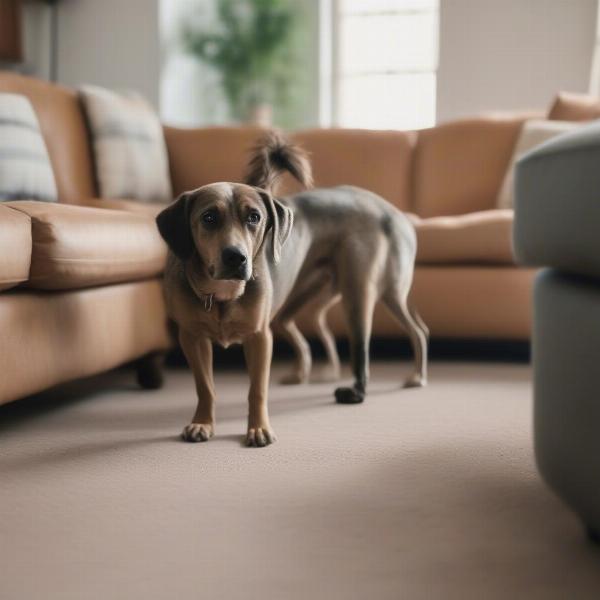Discovering a puddle of dog urine on your beloved couch can be frustrating and confusing. But before you scold your furry friend, understanding the reasons behind this unwelcome behavior is crucial. “Why would my dog pee on my couch?” This question plagues many dog owners, and thankfully, the answer often lies in a combination of medical, behavioral, and environmental factors.
Medical Reasons for Inappropriate Urination
Several medical conditions can cause a dog to lose control of their bladder, leading to accidents on furniture. Urinary tract infections (UTIs), bladder stones, diabetes, kidney disease, and even cognitive decline in older dogs can all contribute to inappropriate urination. If your dog suddenly starts peeing on the couch, a visit to the veterinarian is the first essential step to rule out any underlying health issues.
Behavioral Causes of Couch Peeing
Even healthy dogs can develop the habit of peeing on the couch due to behavioral reasons. Anxiety, stress, or fear, especially in puppies or newly adopted dogs, can trigger inappropriate urination. Similarly, marking territory, particularly in multi-dog households, can manifest as urine marking on furniture. Submissive or excitement urination can also occur, where the dog urinates involuntarily due to overwhelming emotions.
 Dog Peeing on Couch: Behavioral Causes
Dog Peeing on Couch: Behavioral Causes
Environmental Factors Contributing to Urine Accidents
Sometimes, environmental factors play a significant role in a dog’s inappropriate urination. Insufficient potty breaks, especially for puppies or dogs with small bladders, can lead to accidents inside the house. Likewise, inadequate house training or a lack of clear rules can confuse a dog about where they are supposed to eliminate. Changes in the household, such as a new baby or pet, can also stress a dog and trigger unwanted behaviors.
“In my experience, many cases of inappropriate urination stem from a combination of factors,” says Dr. Emily Carter, DVM. “Understanding your dog’s individual needs and addressing both medical and behavioral aspects is key to resolving the issue.”
How to Stop Your Dog from Peeing on the Couch
Once you’ve determined the cause of your dog’s couch-peeing habit, you can implement effective strategies to stop it. Thorough cleaning of the affected area with an enzymatic cleaner is essential to eliminate the urine odor and prevent re-marking. Consistent potty breaks, positive reinforcement training, and managing anxiety-inducing situations can all help.
“Patience and consistency are key when addressing inappropriate urination,” adds Sarah Miller, Certified Dog Trainer. “Building a positive relationship with your dog through training and providing a supportive environment are crucial for long-term success.”
Conclusion
Addressing the question of why your dog pees on the couch requires a holistic approach. By considering medical, behavioral, and environmental factors, you can identify the root cause and implement effective solutions. Remember that patience, consistency, and professional guidance are essential for resolving this frustrating issue and ensuring a happy and healthy relationship with your furry companion.
FAQ
-
My dog is house-trained, why would they suddenly start peeing on the couch? Sudden changes in behavior often indicate underlying medical issues, so a vet check is recommended.
-
How can I clean dog urine from my couch effectively? Use an enzymatic cleaner specifically designed for pet stains to eliminate the odor completely.
-
My dog pees on the couch when I leave. What can I do? This could be due to separation anxiety. Consult a veterinarian or certified dog trainer for guidance.
-
Is it ever too late to house-train an older dog? No, it’s never too late. Patience and positive reinforcement are key.
-
How can I make my dog feel more comfortable and less likely to have accidents? Create a safe and predictable environment, provide plenty of potty breaks, and engage in regular exercise and mental stimulation.
-
What are the signs of a urinary tract infection in dogs? Frequent urination, straining to urinate, bloody urine, and licking the genital area are common signs.
-
Can certain medications cause increased urination in dogs? Yes, some medications can have this side effect. Consult your veterinarian if you suspect this is the case.
ILM Dog is a leading international pet website dedicated to providing expert advice and resources on dog care and wellbeing. We offer comprehensive information on dog breeds, health, training, nutrition, grooming, and much more, catering to dog owners of all experience levels. For expert advice tailored to your dog’s specific needs, contact us at [email protected] or +44 20-3965-8624. ILM Dog is your trusted source for all things dog.